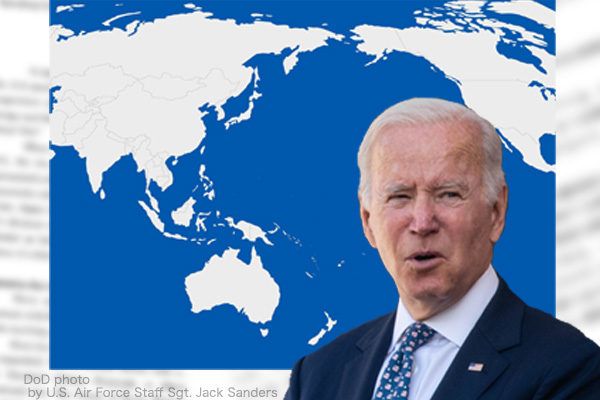U.S. President Joe Biden launched the Indo-Pacific Economic Framework for Prosperity (IPEF) during his visit to Japan. Following talks with relevant countries since the initiative was announced last October, the United States has finally reached a stage to start substantial discussions within the framework. However, I would like to ask if this framework would lead to the establishment of a new economic zone as touted.
Japan has bridged Asia and U.S. for IPEF
The Biden administration has come under congressional fire for doing nothing to counter Chinese diplomatic offensives including an application to join the Comprehensive and Progressive Agreement for Trans-Pacific Partnership (CPTPP), originally called Trans-Pacific Partnership Agreement (TPP). Given that U.S. public opinion opposes free trade, however, a U.S. comeback to the CPTPP free trade deal is politically unconceivable. Then, the U.S. administration has desperately devised the IPEF.
The issue was how widely the IPEF could attract Asian countries. Especially after the previous Trump administration left impression of making light of Asia, Asian countries frankly welcome the Biden administration’s greater engagement in Asia. But they are cautious of being forced to accept U.S.-made rules. They are also reluctant to be forced to choose between China and the U.S. that emphasizes rivalry with China.
In such situation, Japan has played a key role in bridging the U.S. and Asia. Japan has urged the U.S. to take a soft position that the IPEF is for discussions rather than for negotiations, while calling on Asian countries to participate in the discussions. The U.S. has enhanced face-saving efforts to woo Asian countries. Consequently, 13 countries have participated in the IPEF, including seven out of ten members of the Association of Southeast Asian Nations and India that had been cautious about the U.S. initiative.
But the IPEF has just been launched. The problem is whether the initiative, which does not provide participants with access to U.S. markets unlike the original TPP, could actually benefit Asian developing countries. Actual benefits are more important than ideals or rules for developing countries. China is attracting developing countries with actual benefits including access to its huge markets and financial support based on its Belt and Road Initiative.
The IPEF covers four key areas or pillars: (1) trade, (2) supply chains, (3) infrastructure development and decarbonization, and (4) tax and anti-corruption measures. The U.S. allows participants to select an area or areas to join, trying to make it easier for other countries to become IPEF members.
But the trade area excludes trade liberalization including tariff cuts, lacking the finishing touches. Tax and anti-corruption area represents nothing more than demands from U.S. leftist Democrats. I wonder what the Biden administration wants to do with the area.
Semiconductor supply chains to become focus of cooperation
The future focus of attention will be how the IPEF would contribute to enhancing the resilience of supply chains especially those of semiconductors.
In the face of global computer chip shortages and the disruption of supply chains due to Russia’s invasion into Ukraine, it is urgently required also for Asian countries to increase the resilience of semiconductor supply chains. During his stay in South Korea known as a key semiconductor supplier, Biden unusually visited a computer chip plant of Samsung Electronics Co. China sensitively warned South Korea not to disrupt semiconductor supply chains.
Asian countries have semiconductor production bases but should enhance international cooperation on data to jointly address supply disruption risks.
Japan should use the IPEF not only as a sign of its cooperation in a U.S.-led framework but also as a growth strategy for Asia where many Japanese companies operate.
Masahiko Hosokawa is a professor at Meisei University and a former director-general of the Trade Control Department at Japan’s Ministry of Economy, Trade and Industry. He is also a Planning Committee member at the Japan Institute for National Fundamentals.


